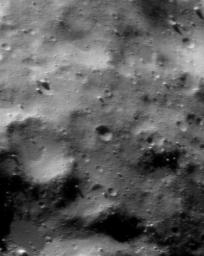
|
Regolith
- Click the image above for a larger view
- Full-Res JPEG (392 x 492) (27.5 kB)
- Full-Res TIFF (392 x 492) (161.5 kB)
Caption:
This picture of Eros, taken by NEAR Shoemaker on January 14, 2001, from an orbital altitude of 38 kilometers (24 miles), visually summarizes the unexpected nature of small-scale features on the asteroid's surface. Armed with a prejudice that the Moon's surface is typical of an airless body, one might expect Eros' surface to be dominated at all scales by craters. Instead, in an image like this, which shows features as small as 6 meters (19 feet) across, the surface is dominated by a blanket of regolith. Boulders litter the landscape, and the smallest craters are obscured - at times almost beyond recognition. Many of the low spots are extremely flat, and appear infilled. The whole scene is about 1.1 kilometers (0.7 miles) across.
Background Info:
Built and managed by The Johns Hopkins University Applied Physics Laboratory, Laurel, Maryland, NEAR was the first spacecraft launched in NASA's Discovery Program of low-cost, small-scale planetary missions. See the NEAR web page at http://near.jhuapl.edu/ for more details.
Cataloging Keywords:
| Name | Value | Additional Values |
|---|---|---|
| Target | 433 Eros | |
| System | Near Earth Objects | |
| Target Type | Asteroid | |
| Mission | NEAR Shoemaker | |
| Instrument Host | NEAR Shoemaker | |
| Host Type | Orbiter | |
| Instrument | Multi-Spectral Imager (MSI) | |
| Detector | ||
| Extra Keywords | Crater, Grayscale, Moon | |
| Acquisition Date | ||
| Release Date | 2001-02-17 | |
| Date in Caption | 2001-01-14 | |
| Image Credit | NASA/JPL/JHUAPL | |
| Source | photojournal.jpl.nasa.gov/catalog/PIA03135 | |
| Identifier | PIA03135 | |
